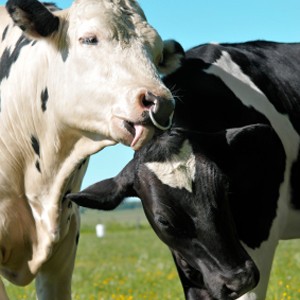
In this month’s “Message from the Chief Vegetarian Officer,” Mark Fergusson notes that Christmas is a time to show compassion and goodwill toward all living beings, including the innocent animals. This is the true meaning of “peace on earth.”
If we truly want to live a compassionate life – not just in words but in real-life action – then we should try our best to never unnecessarily harm other living beings. Great teachers from many spiritual traditions have taught this virtue. In fact, one of Jesus’ primary teachings was, “Do unto others as you would have them do unto you.” He taught compassion—the ability to feel others’ pain in a sympathetic way. Lord Buddha also underlined the importance of living a compassionate life. He said, “In separateness lies the world's great misery, in compassion lies the world's true strength.” He also said, “All beings tremble before violence. All fear death, all love life. See yourself in others. Then whom can you hurt? What harm can you do?”
Every year, billions of innocent animals are subjected to horrifying living conditions followed by an unimaginably cruel death, simply because eating meat is the norm in our society. When we become aware of the extreme pain and suffering caused to these innocent creatures, hopefully we will have the insight to ask ourselves, “Why shouldn’t we extend our compassion to all living beings, including the innocent animals?”
We may also consider another question: What makes it wrong to eat a pet that has a unique and lovable personality, but okay to slaughter other animals and put them on the dinner table?
The reality is that it’s not just the animals raised for food who suffer. Eating meat also brings intense suffering to individuals and society in the form of greatly increased levels of disease and environmental devastation.
Good for Your Health
How can you experience peace if you don’t treat your body right? There’s no need to eat animals to live a strong and healthy life. Healthy vegetarian diets support a lifetime of good health and provide protection against numerous diseases, including our country’s three biggest killers: heart disease, cancer, and stroke.
The American Dietetic Association states that vegetarians have “lower rates of death from ischemic heart disease; ... lower blood cholesterol levels, lower blood pressure, and lower rates of hypertension, type 2 diabetes, and prostate and colon cancer” and that vegetarians are less likely than meat-eaters to be obese.1 Well-planned vegetarian diets provide us with all the nutrients that we need, minus all the saturated fat, cholesterol, and contaminants found in animal flesh and eggs.2 Research has shown that vegetarians are 50 percent less likely to develop heart disease, and they have 40 percent of the cancer rate of meat-eaters.3, 4 Plus, meat-eaters are nine times more likely to be obese than are vegans.5
Good for the Environment
How will you find peace if you don’t treat the Earth (which sustains all of our needs) with the respect she deserves? Many leading environmental organizations, including the National Audubon Society, the WorldWatch Institute, the Sierra Club, and the Union of Concerned Scientists, have recognized that raising animals for food damages the environment more than just about anything else that we do.
Whether it's unchecked air or water pollution, soil erosion, or the overuse of resources, raising animals for food is wreaking havoc on the Earth.
Good for the Innocent Animals
Each year in the United States, approximately ten billion animals are raised and slaughtered for human consumption. Given the suffering these animals endure, and that all our nutritional needs can easily be satisfied without eating these animals, vegetarianism requires consideration. The fact is that eating animals is unnecessary because nature has provided ample vegetables, fruits, grains, legumes and dairy products for human sustenance. Therefore, the slaughter of animals for food is a luxury rather than a necessity and is morally wrong.
We submit for your consideration that a vegetarian lifestyle awakens our spirit of compassion and guides us towards a kinder, gentler society in which we exercise a moral choice to protect animals—not exploit them.
While true “peace on earth” may be a pretty tall order, we can easily bring peace and compassion into our own lives and the lives of those around us. This Christmas, why not be good to yourself, be good to the environment, and be good to the innocent animals?
Add more compassion and peace to your life by choosing a vegetarian diet.
- Ann Mangels, Virginia Messina, and Vesanto Melina, "Position of the American Dietetic Association and Dietitians of Canada: Vegetarian Diets," Journal of the American Dietetic Association, Jun. 2003, pp. 748-65.
- Neal Barnard, M.D., The Power of Your Plate, Book Publishing Co.: Summertown, Tenn., 1990, p. 26.
- Elizabeth Somer, "Eating Meat: A Little Doesn't Hurt," WebMD, 1999
- Neal Barnard, M.D., The Power of Your Plate, Book Publishing Co.: Summertown, Tenn., 1990, p. 26.
- John Robbins, The Food Revolution, Conari Press: Boston, 2001, p. 58.